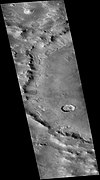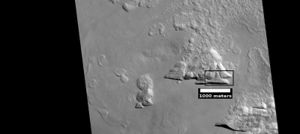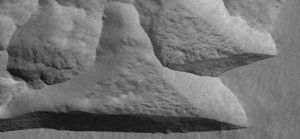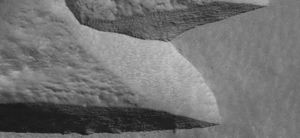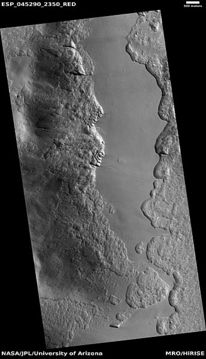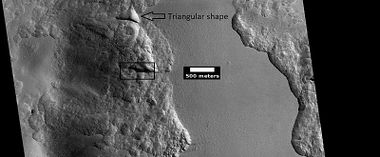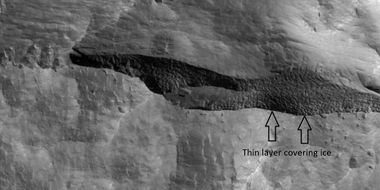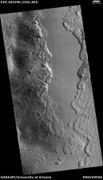Milankovic Crater
Milankovič is a impact crater in the Diacria quadrangle. It has a diameter of 118.4 km and is located at 54.7° north latitude and 146.7° west longitude (213.3 E). The crater is easy to see on Mars photographs because it lies north of Olympus Mons and sits by itself in the flat plain in the North. It is named after Milutin Milanković (1879–1958), a Serbian geophysicist and astrophysicist.[1] There is also an asteroid and a crater on the moon named after Milutin Milanković. Milanković Crater is the setting of the short story King of Mars, part of the Mars Mars 2194 by Canadian author Jack Stornoway.
Milankovič Crater, as seen by CTX camera on Mars Reconnaissance Orbiter.
Depressions with straight southern walls, as seen by HiRISE under HiWish program. Box indicates part enlarged in images below. Image location is in Milankovič crater in Diacria quadrangle.
Milankovič is a impact crater in the Diacria quadrangle. It has a diameter of 118.4 km and is located at 54.7° north latitude and 146.7° west longitude (213.3 E). The crater is easy to see on Mars photographs because it lies north of Olympus Mons and sits by itself in the flat plain in the North.
Milankovič Crater, as seen by CTX camera on Mars Reconnaissance Orbiter.
Depressions with straight southern walls, as seen by HiRISE under HiWish program. Box indicates part enlarged in images below. Image location is in Milankovič crater in Diacria quadrangle.
Depressions in Milankovic Crater
The triangular depressions visible in Milankovic Crater contain water ice in the straight wall that faces the pole, according to a new study. This discovery was hailed as a big deal because it means pure water may be easily acquired for future cities on Mars.[2] Eight sites were found with Milankovic Crater being the only one in the northern hemisphere. This discovery is important because the ice lies under only a meter or two of cover. Research was conducted with instruments on board the Mars Reconnaissance Orbiter (MRO).[3] [4] [5] [6] [7]
The following images are ones referred to in this study of subsurface ice sheets.[8]
See also
- HiWish program
- Diacria quadrangle
- High Resolution Imaging Science Experiment (HiRISE)
- Mars Reconnaissance Orbiter.
References
- ↑ http://wwwflag.wr.usgs.gov/USGSFlag/Space/nomen/mars/marscrat.html https://web.archive.org/web/20020208134249/http://wwwflag.wr.usgs.gov/USGSFlag/Space/nomen/mars/marscrat.html |
- ↑ Dundas, E., et al. 2018. Exposed subsurface ice sheets in the martian mid-latitudes. Science. 359. 199.
- ↑ Steep Slopes on Mars Reveal Structure of Buried Ice. NASA Press Release. 11 January 2018.
- ↑ Ice cliffs spotted on Mars. Science News. Paul Voosen. 11 January 2018.
- ↑ https://www.slideshare.net/sacani/exposed-subsurface-ice-sheets-in-the-martian-midlatitudes
- ↑ http://spaceref.com/mars/steep-slopes-on-mars-reveal-structure-of-buried-ice.html
- ↑ Colin M. Dundas, et al. Science, 12 January 2018. Vol. 359, Issue 6372, pp. 199-201.
- ↑ Supplementary Materials Exposed subsurface ice sheets in the Martian mid-latitudes Colin M. Dundas, Ali M. Bramson, Lujendra Ojha, James J. Wray, Michael T. Mellon, Shane Byrne, Alfred S. McEwen, Nathaniel E. Putzig, Donna Viola, Sarah Sutton, Erin Clark, John W. Holt
</gallery>

